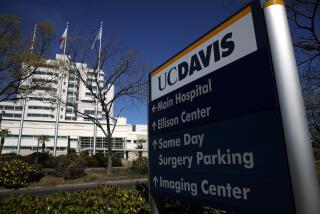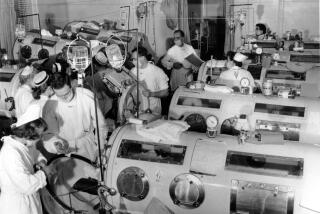Thomas C. Peebles dies at 89; doctor isolated measles virus
Dr. Thomas C. Peebles, a World War II bomber pilot who isolated the measles virus, setting the stage for development of the vaccine that freed the world from the deadly scourge, died July 8 at his home in Port Charlotte, Fla. He was 89.
Peebles also led a team that showed the tetanus vaccine could be given every decade instead of every year, developed a way to add fluoride to children’s vitamins to prevent tooth decay and founded one of the country’s first health maintenance organizations.
The measles discovery came in only his third year after graduation from medical school while he was working in the Children’s Hospital Boston laboratory of Dr. John F. Enders, who won the 1954 Nobel Prize in Physiology or Medicine for isolating the polio virus.
Enders assigned his young protege to investigate the cause of measles, which in the mid-1950s infected nearly every American child before age 15 and killed about 450 each year. When an outbreak occurred at a nearby elementary school, Enders collected blood samples and throat swabs from infected children, telling them that they were “standing on the frontiers of science.”
Attempting to grow the suspected virus in dishes containing human tissues, Peebles found suspicious blobs of damaged cells in the culture taken from an 11-year-old named David Edmonston. Nobody else in the lab thought he had found the virus, however, and Enders removed him from the project.
Peebles kept working on his own time and eventually isolated the virus. When he injected it into monkeys, they developed measles.
“I am sure, as is often the case in scientific endeavor, that much of the successful recognition and isolation of this virus lay in perseverance, newness to the field, and failure to be bound by the preconceived ideas that caused others in the laboratory to miss this new effect,” he wrote later.
Using the newly developed virus strain, called Edmonston B, the Enders team developed a measles vaccine that was licensed in 1963 and the measles rate began falling sharply.
Later during the 1960s, Peebles led a Harvard team that studied the tetanus vaccine. They found that the vaccine contained tens to hundreds of times the necessary dose of the tetanus antigen, creating a danger of allergic reactions that was greater than the risk of developing tetanus. They proved that a lower dose was safe and that it could be given much less frequently than was the current practice.
While he was working at the hospital, Peebles also ran a private practice out of his home. During routine examinations, he noticed that children living in communities where water was fluoridated had fewer cavities. Organizing a clinical trial among his own patients, he developed a fluoride additive for vitamins that reduced cavities among children in non-fluoridating communities.
Thomas Chalmers Peebles was born June 5, 1921, in Newton, Mass., a suburb of Boston. His father was a professor of German at Boston University and his mother practiced homeopathy. The young Peebles enrolled at Harvard, majoring in French in hopes of emulating his father.
Graduating in 1942, he enlisted in the Navy, seeking an “exciting” position. He went to flight school, almost washing out because of a bad exam. A paperwork foul-up allowed him to take the flight test, however, and he graduated, flying B-24 Liberators in the South Pacific. His crew, which often mentioned Peebles’ bravery and leadership, named its plane Monkey Business in honor of its pet monkey. Peebles was awarded the Distinguished Flying Cross.
A flight surgeon Peebles chatted with frequently during the war over copious quantities of “medicinal whiskey” convinced him to enter the medical profession. At war’s end, he applied to Harvard Medical School, only to be rejected because of a lack of pre-med courses and a “D” in biology. He spent a year at Boston University studying pre-med, then reapplied and was accepted. But it was too late to enter for that semester and he spent a year teaching French in Aiken, S.C.
In 1970, he founded General Medical Associates, a group pediatric practice that was later merged with its largest competitor to become Harvard Health. Peebles served as president until he retired in 1991. He also advised the Reagan administration on healthcare issues.
Peebles is survived by his second wife, the former Anne Diffley; three children from his first marriage that ended in divorce, Douglas and James of Severna Park, Md., and M’Lou Peebles Douglass of Cataumet, Mass.; a sister, Carol Peebles McLain of Melrose, Mass; and five grandchildren.
thomas.maugh@latimes.com
More to Read
Start your day right
Sign up for Essential California for the L.A. Times biggest news, features and recommendations in your inbox six days a week.
You may occasionally receive promotional content from the Los Angeles Times.






